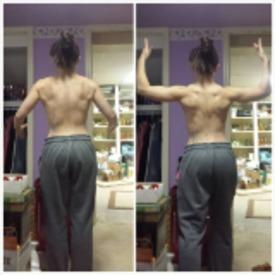We are pleased to announce that as of March 4, 2025, an updated Rich Text Editor has been introduced in the MyFitnessPal Community. To learn more about the changes, please click here. We look forward to sharing this new feature with you!
Does the ORDER you do exercises increase the effectiveness?

Lysander666
Posts: 275 Member
Some workouts feel more effecticve than others even though you're doing the same exercises. I'm starting to wonder if this is to do with the order in which you do those exercises.
For instance, yesterday I did 3 sets of barbell curls followed by my shoulder supersets. It felt really effective doing them subsequently whereas in the past I might have done something else in between.
So is this true? Does the order you do your exercises in sometimes increase their effectiveness?
For instance, yesterday I did 3 sets of barbell curls followed by my shoulder supersets. It felt really effective doing them subsequently whereas in the past I might have done something else in between.
So is this true? Does the order you do your exercises in sometimes increase their effectiveness?
0
Replies
-
I believe that the order of exercises absolutely does matter, and any program that I have created for myself is based on programs that are already in existance, created by people who know what they're doing.
I've found that starting with compound lifts and saving the isolation moves for the end works best for me. For example, if I tried to squat after doing leg extensions and leg curls, I wouldn't be able to use nearly as much weight as I do when I start the workout with squats.
It's best to work the larger muscles first, then the smaller ones. So if you are working back and biceps (for example), hit the back first before you do the biceps.0 -
Good post, thank you. Of course the order does matter, you're right, I remember in the past trying to do a shoulder press after tricep press. No, doesn't happen because you're doing too much with one muscle group in a short space.
I'll try your suggestion in your end paragraph as well.0 -
I find the opposite, for me ending in big compound moves is my preference so i give everything left and am done. Best starting with dumbell work first as the smaller muscles tend to fatigue quicker than the main ones.
Try something for a few weeks and change it up see what works for you0 -
I just read a book which talked about this in terms of when you should do cardio and when you should do weights. The take-home message is that the workout you do first is the one that "takes," so if you're more interested in improving cardio, you should do that first, and if you want to build muscle, do weights first.0
-
I feel like I can push myself the hardest at whatever I do first, so I vary the order.
Also, speaking as a neuroscientist, research suggests that in order to get increased neurogenesis (generation of new brain cells) from exercise, you must keep introducing novelty, so I think that's another good reason to vary.0 -
Start with the most neurologically demanding exercises, which, from what I've seen, goes plyometrics > compound lifts > isolation lifts > traditional cardio0
-
I just read a book which talked about this in terms of when you should do cardio and when you should do weights. The take-home message is that the workout you do first is the one that "takes," so if you're more interested in improving cardio, you should do that first, and if you want to build muscle, do weights first.
I agree with this. If I'm going for a big 1RM on a lift that day, I'll do the lift first, along with other weight exercises, then give whatever I have left to cardio (If I have anything left lol). If I'm going for a PR on a 5k, then I won't do weights first because I'd be worried it would affect my running time.
As far as in what order to do certain weight lifts, I'm not sure if there is a right answer to that or not, I'm not knowledgeable on it. I was just thinking of this yesterday though and I believe that as long as you are doing all the exercises, that's what matters most. I don't think it matters AS MUCH what order you do them in.0 -
Books I've read have always recommended cardio before strength training and large muscle groups before smaller ones.0
This discussion has been closed.
Categories
- All Categories
- 1.4M Health, Wellness and Goals
- 391.6K Introduce Yourself
- 43.5K Getting Started
- 259.7K Health and Weight Loss
- 176.1K Food and Nutrition
- 47.3K Recipes
- 232.7K Fitness and Exercise
- 393 Sleep, Mindfulness and Overall Wellness
- 6.4K Goal: Maintaining Weight
- 8.5K Goal: Gaining Weight and Body Building
- 153.1K Motivation and Support
- 7.8K Challenges
- 1.3K Debate Club
- 96.3K Chit-Chat
- 2.5K Fun and Games
- 3.2K MyFitnessPal Information
- 23 News and Announcements
- 1.2K Feature Suggestions and Ideas
- 2.3K MyFitnessPal Tech Support Questions






